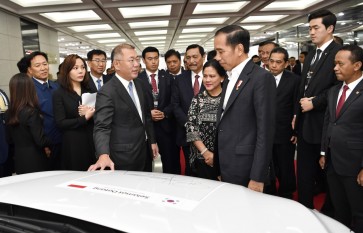Popular Reads
Top Results
Can't find what you're looking for?
View all search resultsPopular Reads
Top Results
Can't find what you're looking for?
View all search resultsConsumers’ concerns haunt Indonesia’s electric vehicle agenda
Under the leadership of President Joko “Jokowi” Widodo, the government has set an ambitious target in developing EVs.
Change text size
Gift Premium Articles
to Anyone
 President Joko "Jokowi" Widodo (center right) and executive vice chairman of Hyundai Motor Group Chung Euisun (center left) chat in front of Kona Electric after leaving a signature on the car, prior to the investment clinch ceremony that took place at the automaker’s plant in Ulsan, on Nov.26 (The Korea Herald/ANN/ Hyundai Motor Group)
President Joko "Jokowi" Widodo (center right) and executive vice chairman of Hyundai Motor Group Chung Euisun (center left) chat in front of Kona Electric after leaving a signature on the car, prior to the investment clinch ceremony that took place at the automaker’s plant in Ulsan, on Nov.26 (The Korea Herald/ANN/ Hyundai Motor Group)
T
he government’s ambitious target in developing the country’s electric vehicle (EV) manufacturing program is facing problems related to demand such as prices, battery charging, maintenance, performance and variety of models.
“The problems are making it difficult for the EV industry to grow,” Association of Indonesian Automotive Manufacturers (Gaikindo) secretary-general Kukuh Kumara said during a seminar on the preparations of the Indonesian automotive industry in entering the Industry 4.0 era.
He said prices remained a major problem for Indonesian consumers, whose purchasing power was still relatively smaller than those in developed countries. The purchasing capacity of most middle-income Indonesians to buy a car was only about Rp 300 million (about US$21,400), far lower than the price of a midsize electric car, which reached about Rp 800 million, he added.
Speaking at the same event, Danareksa Research Institute chief economist Moekti Prasetiani Soejachmoen, whose PhD dissertation was on the automotive industry, said a recent consumer survey disclosed seven concerns about the use of EVs.
Running-out of power was the highest of the seven concerns, followed by low availability of charging stations, vehicle prices, maintenance costs, lack of variety in models, inadequate performance and risks of an overwhelmed electricity grid, she said, quoting the survey conducted by Pertamina Energy Institute.
Of the surveyed respondents, about 30 percent of EV users doubted whether a fully charged EV could last their entire trip.
In terms of power, the battery electric vehicle (BEV) Nissan Leaf, for example, has a 243 kilometer driving range on a fully charged 40 kilowatt hour (kWh) battery, while Tesla Model 3 has a 354 km driving range with a 50 kWh battery.

















